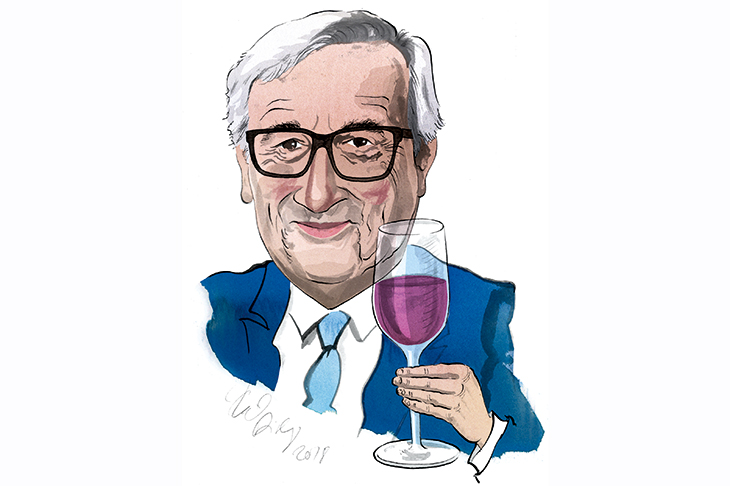The atmosphere in Brussels has become, of late, reminiscent of the late Brezhnev era. We have a political system run by a bureaucratic apparatus which — just like the former USSR — serves to conceal important evidence. Especially when it comes to the health of its supreme leader, Jean-Claude Juncker.
At the Nato summit gala dinner last week, videos emerged showing Juncker unable to climb the few steps leading to the podium. He hesitates at the bottom before being grabbed by the very sturdy Ukrainian Petro Poroshenko. He is then held up during the ceremony. Afterwards Juncker — who is only 63, hardly an old man — staggers and wobbles away, propped up by Mark Rutte and António Costa, prime ministers of the Netherlands and Portugal. When asked about the incident, Juncker said that he suffered from sporadic ‘sciatica’. This remains the official explanation.
Anyone who dares question this explanation is guilty of ‘indecency’, according to Viviane Reding, an MEP and former Luxembourg commissioner. Reding is also the political patron of Martin Selmayr, Juncker’s great protégé, who recently plotted his way to become head of the mighty EU civil service. ‘I think it’s more than tasteless that some press try to make insulting headlines by exploiting President Juncker’s pain,’ said spokesman Margaritis Schinas. Move along, we are told: nothing to see.
But the ‘sciatica’ explanation does not really stand up to scrutiny. It would suggest Juncker suffered agonising back pain, but he did not seem to be in any discomfort. The video shows him smiling, laughing, talking and kissing his partners as they helped him walk. An acute crisis of sciatica nails its victims to bed. It’s possible that his movement may have been impaired by powerful painkillers. According to several sources, Juncker was actually in a wheelchair when photographers and TVs were not looking, and did not even speak during dinner.
This in itself would be quite a concern, given that the issues with Trump at that summit were vital for Europe. However, the same witnesses say Juncker drank heavily during the meal, which is difficult to reconcile with the use of painkillers.
And if he genuinely suffers from sciatica, how was he able to visit China and Japan a few days later? Sciatica makes such long-haul flights difficult to envisage. One diplomat jokes that if Juncker does suffer from debilitating back pain, he must be powered by ‘an uncommon moral force, an ability to withstand suffering for the good of Europe’.
The other explanation — and the assumption of a great many in Brussels — is Mr Juncker is a bit too fond of the bottle. Which he constantly denies. ‘I have a problem of balance with my left leg,’ he once said to us, ‘which forces me to grab the ramp when I’m on a staircase. A Dutch minister, whom I had grabbed by the arm after lunch, said I was drunk. The problem goes back to a serious car accident — in 1989 I spent three weeks in a coma, then six months in a wheelchair.’
Numerous people, in Luxembourg, in Brussels and in European capitals, can attest to several examples of Juncker drinking. ‘When a bailiff brings him a glass of water at a council of ministers, we all know it’s gin,’ says a former minister. The former Eurogroup president, Jeroen Dijsselbloem of the Netherlands, did not hesitate to describe on Dutch television a Luxembourgish man who was often drunk during Eurogroups.
Pierre Moscovici, a French European commissioner and former finance minister, delicately points out that alcohol ‘never prevented Juncker from being functional’. Sometimes, a little too functional. Everyone still remembers the scenes of the 2015 Riga summit when Juncker’s antics were on full display to the world’s cameras. Viktor Orbán was welcomed with a cheery ‘The dictator is coming!’ then a playful slap to the face. The Belgian Charles Michel was greeted with a kiss on his bald head. It was later put down to Juncker’s supposedly effervescent personality. As the leaders are not subject to breathalysers, we will never know any different.
But his behaviour at the Nato summit went beyond jokes about tipsy Luxembourgers. The videos suggested a man manifestly seriously ill, unable to move alone. In other words, it raises the question of his ability to govern. It is no coincidence that he has become totally dependent on Martin Selmayr, his ambitious secretary general and former chief of staff (and architect of his ascent to the head of the EU). No wonder that Juncker tore up the rules of the European civil service to put Selmayr in charge of the whole 33,000-strong apparatus.
He even threatened to resign if the European Parliament demanded the departure of his protégé in an unprecedented move for a politician. The deterioration of Juncker combined with the power of Selmayr indicates an unusual set-up with the President as the puppet. Pull back the gin-soaked curtain and we may find the real influence is wielded by Selmayr, an unelected and unaccountable Eurocrat.
Juncker’s spokesman insists there is ‘no anxiety whatsoever about Juncker’s ability to work hard, as he always does’. But democracy demands total transparency in the form of an official health certificate. After what the world saw last week, this excuse will not do.
Got something to add? Join the discussion and comment below.
Get 10 issues for just $10
Subscribe to The Spectator Australia today for the next 10 magazine issues, plus full online access, for just $10.
You might disagree with half of it, but you’ll enjoy reading all of it. Try your first month for free, then just $2 a week for the remainder of your first year.














Comments
Don't miss out
Join the conversation with other Spectator Australia readers. Subscribe to leave a comment.
SUBSCRIBEAlready a subscriber? Log in